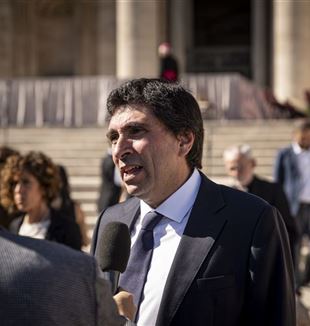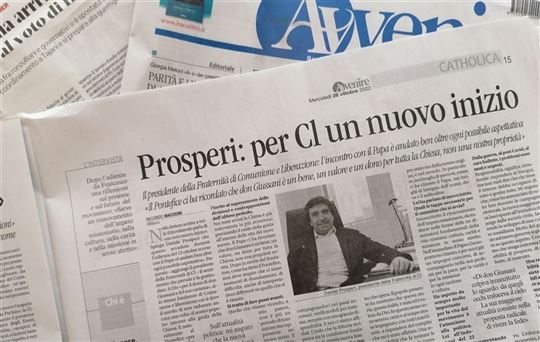
Prosperi: A new beginning for CL
An interview with the President of the Fraternity of CL in Avvenire: the meeting with the Pope exceeded all expectations. “The Pope has reminded us that Fr. Giussani is an asset for the whole Church.”In the letter he has written to the entire movement he speaks of "a true new beginning." Davide Prosperi explains what happened during the audience with the Pope on October 15, which "exceeded all possible expectations.” For this reason – adds the president of the Fraternity of CL – "one sentiment prevails over all else: gratitude. Gratitude to God for the gift of Fr. Giussani and his charism,” to the founder of Communion and Liberation who must be recognised for having brought together “our people” around the leadership of the Church.
And of course there is gratitude to the Pope "for the affectionate and profound words he dedicated to Giussani" and for "having shown us not only the point towards which we must strive, but also the road we must travel to get there." This is not to be taken for granted. CL is experiencing a difficult time. Following the founder’s death and the reasonable confusion that followed, profound differences have also arisen regarding the interpretation of the charism and its adaptation to the times in which we live.
It is a "crisis" culminated with the appointment of the Archbishop of Taranto, Filippo Santoro as "special delegate" to the "Memores Domini" (the association of consecrated laity) and the resignation of Fr. Julian Carrón as president of the Fraternity of CL.
He was succeeded on September 21, 2021, by Prosperi, 50 years old, who is married and the father of four children, a professor of biochemistry and the director of the Nanomedicine Center at the University of Milano-Bicocca. "The meeting with the Pope," he explains, "has specified in a clear and explicit way the task that the Church entrusts to the movement.
We have been asked for an authentic conversion to rediscover the grace of the charism received from Giussani and to enjoy even more the beauty of Christ's companionship in our community, so that we can communicate it to everyone. In this sense, the more we are willing to follow the steps that Pope Francis has indicated to us, the more our companionship will be a place full of light, unity and hope, for the whole Church and humanity."
Among the steps indicated by Pope Francis, the call to overcome the recent divisions and oppositions strongly emerges.
In recent months, the Church has intervened on several occasions, clarifying the role of leadership within the life of the movement. The Pope has reminded us that Fr. Giussani is an asset, a value, a gift for the whole Church, not our property. After the founder's death, as the Pope said, it should not surprise us that there are moments of perplexity, difficulties, and even different interpretations of what we have experienced.
It is about taking steps forward.
What we are experiencing, in my opinion, is no longer a period of transition but represents a new beginning. The Pope and the Church have intervened with authority, saying to us: we are with you, we walk together. For me, this is the period of revival.
One of the most discussed topics is that interpretation of the charism. It is an issue that concerns both the internal life of the movement and its relationship with the ecclesiastical authority.
We got to the meeting with the Pope also thanks to the companionship of the Dicastery for the Laity, Family and Life throughout this year, which has accompanied us in the necessary steps, verifying them together, always with great availability. And we have entrusted ourselves. I believe that mutual trust is the fundamental condition of this new phase.
However, there have also been moments of misunderstanding.
If, over time, the certainty that it is the Spirit of God who governs everything through the Church He has willed does not prevail, misunderstandings and friction will emerge in the long run.
You are at the beginning of your term as president of the Fraternity of CL. What is your biggest concern?
I cannot say I am concerned in the anxious sense of the word. At the audience with the Pope, I saw clearly that nothing depends on us; it is an Other who acts. The people present showed that this history, this reality, was and is willed by God. In this sense I am serene, certain and at the same time committed, with all my limitations, to respond to the task entrusted to me. It is a responsibility that makes my legs tremble but that I carry in communion with those who share it with me. I believe that the charism is like an eagle: we cannot think of caring for it by locking it in a cage. Because by doing so, over time, it will pluck itself; it will get sick until it dies. The eagle must fly.
And where should that flight take you?
I think that the path that begins now is first of all that of mission: in the various spheres of society, as it has always been since our origin, and in the world. In particular, in places of poverty, as the Pope has asked us, in places of human need, where there is loneliness.
You spoke of a new beginning. What are the necessary steps for the journey ahead?
First of all, the renewal of the missionary impetus, to be translated into the forms of the three fundamental dimensions of Christian life: culture, charity and mission in the strict sense. In the immediate term, the Pope has specifically asked us – and this is already a concrete commitment for us – to accompany him in his prophecy for peace, for charity and for mission in every nation and culture.
One aspect that has always been very important to the life of the movement is the focus on politics. The day after the Italian elections, you commented on the outcome of the vote, recalling above all a sense of responsibility.
If I were to say something to the new majority that is beginning to govern, I would talk about responsibility to the whole country, not just to those who voted for them. This involves a sense of awareness and knowledge of the needs and demands of everyone.
From the war, to post-Covid, to high utility bills, there are many and urgent problems.
Responsibility certainly means responding to needs, but it does not mean that whoever is at the helm must take care of everything and manage everything. I hope, as it announced it would during the election campaign, that the new majority will leave room for the initiative that arises from civil society, encouraging the development of a subsidiary culture. Much of the judgment on the new government will play with regards to this. We trust that it will be given the opportunity to propose, to contribute, to build.
That is a responsibility that you are also willing to take on as a movement.
Absolutely yes, especially in the sphere that we are most responsible for, which is education. Education, right now, is the most serious urgency, even more so than the energy crisis.
We are in the centenary of Fr. Giussani's birth. What aspect of him fascinated you the most?
On a personal level, since I was lucky enough to get to know and spend time with him, it was first and foremost his gaze. In looking at him you had the perception that the sky was shining in his eyes. I used to visit him often, also because of my responsibility in the movement. Whatever our topic of conversation, even if it was simply about music, I would come home more certain and felt useful. And then in spending time with him, meeting him, following him, Christ was everywhere. This was very clear. Jesus was so ever-present in his memory, in his way of looking at things, that He became the definition of his life. That was inevitably reflected in his way of being with people and in guiding a reality like ours.
What is the movement’s greatest novelty?
I would say in its radical nature, that is, in its radical proposal to live faith. Today we are asking ourselves what we can do to reach the hearts of the people of our time, so incapable of having the slightest certainty about anything. Yet history tells us that while kingdoms and empires have collapsed, the Church remains. And it remains because the content of its message is not an ideology but the presence of Christ. Giussani bet every moment on this presence, and this is what we too are now called to do, imitating him. Nothing more. It seems little, but it is everything.
Avvenire, October 26, 2022